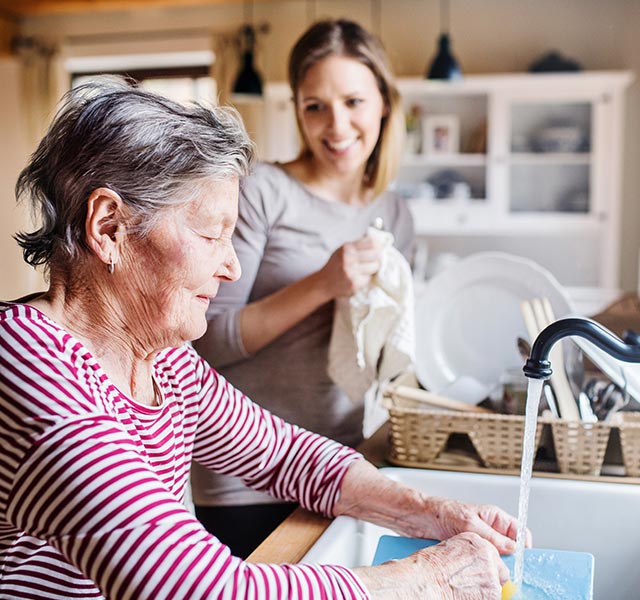As parents and other relatives age, we want to ensure they’re safe and independent for as long as possible. It’s not easy to bring in a caregiver or move someone to an assisted living or nursing home when they need more care—or to know when that’s the right decision.
What are the signs that an elderly loved one should no longer live alone? When should you discuss these issues so they get the care they need?
These are questions Saba Azhar, M.D., a geriatrician at Henry Ford Health, addresses with her patients and their families. “Open and early communication with aging loved ones is critical. It helps you stay abreast of how they’re functioning daily. You can also learn about their wishes for future care and observe changes that signal it’s time to make a change.”
Identifying When Seniors Need Help
Identifying when your loved one can no longer live independently may seem daunting. Dr. Azhar suggests looking for changes that signal they’re struggling with daily living tasks and need additional support in these areas:
- Personal hygiene: Are they having difficulty bathing, toileting or grooming? “Self-neglect is one of the biggest signs someone needs care,” Dr. Azhar says. Look for changes in your loved one’s appearance.
- Dressing: You may also notice changes in how your loved one dresses. They may not be wearing clothes appropriate for the weather, or their clothes may look disheveled. Medical conditions like arthritis or Parkinson’s disease can make it difficult to snap, zip or button clothing.
- Eating habits: Pay attention to your loved one’s eating habits to ensure they get the nutrition they need each day. Your loved one could experience weight loss if they have difficulty cooking. Weight loss may also occur with many medical conditions, such as cancer, diabetes, digestive disorders and rheumatoid arthritis. Look for signs of dehydration, such as dry skin, fatigue and confusion.
- Cognitive abilities: Does your loved one get easily confused or have difficulty recognizing family or friends? Are they able to manage their finances and personal affairs? Do they miss payments or misplace important papers?
- Physical health: Do you notice physical changes such as difficulty walking, fatigue or dizziness? These symptoms may impact mobility and increase risk for falls. Is your loved one taking prescribed medications and visiting the doctor for regular physicals, screening tests and vaccinations?
- Mental health: If your loved one struggles with daily activities, you may observe mood changes such as signs of anxiety or depression. Seniors experiencing dementia may act impulsively or stop caring about the feelings of others.
- Household: Is your loved one’s home or apartment clean and free of clutter? Some seniors hoard objects or papers, increasing the risk of falls and unsanitary conditions. Are they living in a neighborhood where they can safely come and go from their home?
If you see signs your loved one should no longer live alone, consult with their doctor. “Sometimes seniors are reluctant to tell a family member if they have difficulties. For example, they may have missed a doctor’s appointment because they have difficulty driving,” Dr. Azhar says. “Your loved ones may feel more comfortable discussing their challenges with a doctor with whom they have a trusted relationship.”
Starting The Conversation: Tips For Discussing Senior Care Options
So when do you sit down to discuss your aging loved one’s care needs? “Start early, long before injuries or medical complications occur,” Dr. Azhar says. She suggests keeping these strategies in mind as you start the conversation:
- Respect your loved ones’ feelings: It can be frightening to realize you can no longer live without assistance. Ask loved ones about their wishes for their care now and in the future. Listen to their preferences and concerns about available care options.
- Encourage advanced planning: Suggest that your loved one create an advanced health directive or living will to outline their end-of-life wishes. These documents can also designate a person to make healthcare decisions if your loved one cannot do so. You can also start to explore care options within the community, such as available caregivers, assisted living facilities and nursing homes.
- Enlist help from others: Ask your loved one’s doctor, other family members, clergy or a social worker to join the conversation.
- Take a step-by-step approach: You don’t need to identify all the answers in your first conversation. Take time to work through these issues, discuss your loved one’s needs and explore available options together.
- Don’t forget your self-care: Finding the proper care solution for your aging loved one can be stressful and time-consuming. You will be more helpful to your loved one if you take time for self-care.
Senior Care Resource
“Many people prefer to stay in their own homes as they age. Moving to a new living situation is a difficult transition for older adults, often increasing feelings of confusion and anxiety,” Dr. Azhar says. “Start with a caregiver that allows your loved one to age in place and stay at home until their needs escalate.”
She recommends these resources to learn more about eldercare options:
- Healthcare professionals: Your loved one’s doctor or a social worker can provide information about available options within your loved one’s community. Geriatric care managers, who are licensed nurses or social workers, can also help assess your loved one and suggest available services. These professionals are beneficial if you’re a long-distance caregiver who needs help staying connected with your loved one’s care.
- Senior care online resources: Explore online resources such as National Institute on Aging and Aging Life Care Association.
Looking for more information about geriatric care or want to make an appointment with a geriatrician? Call 1-800-436-7936 or visit henryford.com.
Dr. Saba Azhar is a geriatrician who sees patients at Henry Ford Medical Center - Detroit Northwest.



